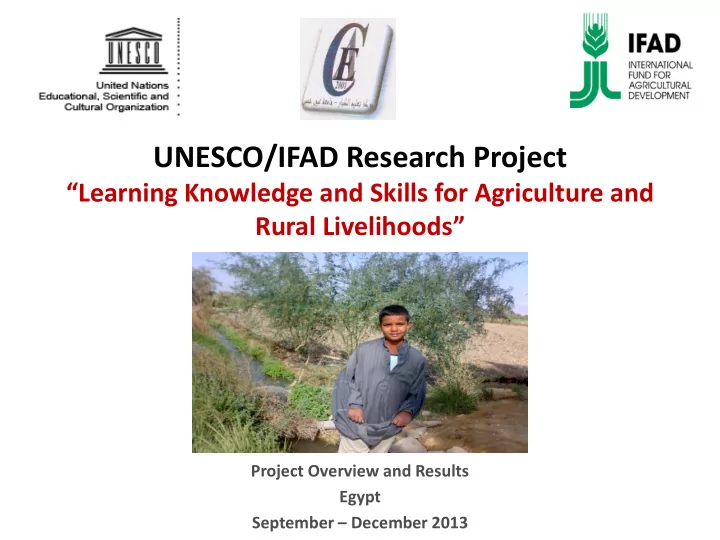

UNESCO/IFAD Research Project “Learning Knowledge and Skills for Agriculture and Rural Livelihoods” Project Overview and Results Egypt September – December 2013
Research Process and Main Findings in Egypt National Research Team: Adult Education Center, Ain Shams University
First Workshop Two-day workshop which took place in the period from September • 30 th – October 1 st , 2013. The objective was to officially kick-off the project in Egypt, discuss • the project’s opportunities and expected results, and reach consensus between the project’s Global Research Coordinator and the local research team regarding the research methodology, data collection methods and analysis. Was attended by a myriad of partners and stakeholders including • the Global Research Coordinator, local research team, UNESCO Cairo Office team, representatives from relevant ministries (such as Youth, Environment, Sports and Agriculture), Adult Education Authority, NGO’s, local farmers, and national research centers.
First Workshop The following timeframe was agreed upon collectively between • UNESCO Cairo Office, Global Research Coordinator and the local research team: 1 October – 20 November: Fieldwork and data analysis 20 November – 7 December: Preparing the first draft of the report 8 – 10 December: Second workshop 20 December: Delivery of the final report (Arabic and English)
Methodology A. Desk Study: the research focuses on • Socio-economic context for the Egyptian society • Agriculture development in Egypt • Targeting and empowering of youth at rural areas • Investment in adult education • Policies, strategies and national legal frameworks for agriculture education and livelihood at rural areas • Knowledge and skills for agriculture education and livelihood
Methodology A. Desk Study: • Total area of Egypt: 1,010,410 sq km • Population: 92 m; 50.7 % males, 49.3 % females; 43% live in urban areas and 57 % in rural areas • Fayoum: highest rate of illiteracy in Upper Egypt; 23.97 % illiterates; 30.56 % females and 17.98 % males • 45 % of the poor are illiterates and likelihood that are illiterate becomes poor is 24 %.
Methodology B. Field Study: 1. Selection of research sample: Tounis and Gemi villages selected due to diversity of ecological, natural and demographical actitivities. Table showing sample distribution in next slide 2. Preparing the data collection tool: participant observation; focus group discussions; life history interviews; service providers questionnaire; and case studies. 3. Implementation of the field study
Sample distribution data collection tools Research Sample Participant Observation Tounis , Gemi 7 young farmers groups of age category • (15-30 years old) 3 male , 3 female and group older Focus group discussions male and female farmer – 36 from Tunis and 42 from Gemi village 30 young farmers • Life history (15 males and 15 females) from each village 11 service providers were selected from the • organizations and population under the research Service providers from two villages. Tounis village: Evelyn Pottery School • Gemi Field Classroom experience for adult and young Case studies • women who dropped out of school
Research Locations Senoras Youssef El Seddeek Map of Fayoum Map of Egypt
• Target group for the current research are youth at Fayoum governorate (males/ females). The following indicates the reasons behind selecting those two villages: 1. As an agricultural area (cultivated area is mentioned compared with republic area). 2. As a high illiteracy rate governorate (percentage of illiteracy is mentioned). 3. As a governorate that combines (cultivated area and desert backyard area simultaneously which represents ecological diversity for the republic .
Main Findings and Results
Findings Government, public bodies and civil society organizations do not • provide effective learning programs for the provision of agriculture knowledge and skills for young farmers There is a gap between the national policies and strategies related • to teaching agriculture Knowledge and skills are gained mainly from parents, neighbours, • relatives and by experience from trial and error (informal learning) Skills learned by youth formally were not useful for improving their • livelihood or finding a job Women are more attached to land than men, and more motivated • to study but faced more obstacles Men preferred jobs in the city rather than agricultural jobs in rural • areas
Second Workshop The local research team organized the second project workshop • from 9 – 10 December 2013 to present the research findings and results to the Global Research Coordinator and UNESCO Cairo Office team. Topics covered included: • Main aspects of the theoretical study Fieldwork tools Analysis and results of fieldwork Case studies from the field
Future Vision Linking national policies and strategies with rural development • plans and programs, in addition to monitoring implementation. Targeting young people at deprived rural areas, should give greater • importance to necessary skills, provide training on modern farming techniques to enhance productivity Involving youth in rural areas in planning for training programs • related to agriculture and associated activities such as marketing. Training needs for young females in rural areas should be placed • among the priorities for policy and decision-makers.
Providing a second chance for education for those who missed the • opportunity of education or were unable to complete their education. They should be enabled by providing basic skills of reading, writing and arithmetic, as well as necessary live skills to live with dignity Modern technology should be used to enhance young people’s • opportunities. Internet can be used through designing of special websites in the field of • agriculture extension for youth. Young female farmers can communicate through the website for access to knowledge and skills as well as discussing and sharing information. •
Providing capacity building programs for officers at the agriculture • cooperatives, village banks and the local NGO’s in the field of rural development. Establishing unions among farmers to increase their skills in marketing and • negotiation.
Recommend
More recommend